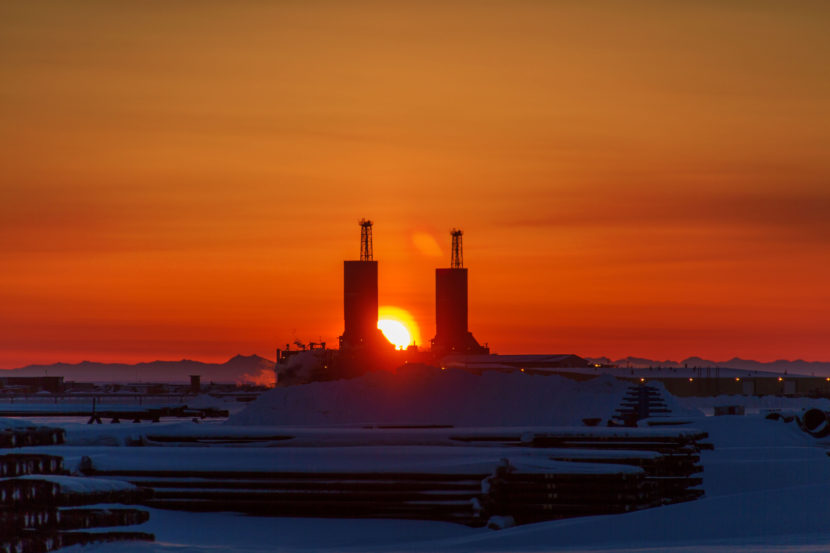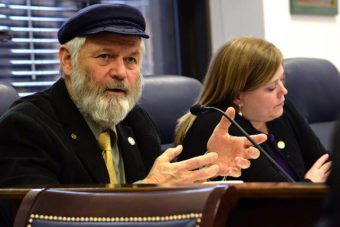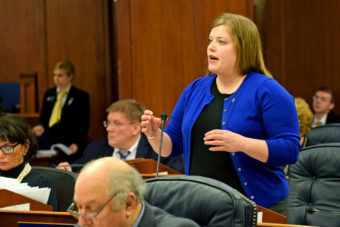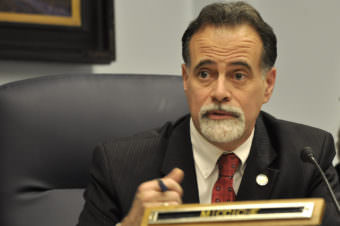
A radical reshuffling in the state House has shifted control and the ruling philosophy for the upcoming session, but key questions on state energy policy remain the same.
As the dust settles from the election lawmakers find themselves in a new world, with plenty of new faces, but they’re staring down some of the same issues that kept them locked in Juneau last session:
Can the state afford its current system of oil tax credits? And what will happen to the Alaska LNG project?
In the state House, a new coalition of Democrats, Independents — and moderate Republicans are taking over from the Republican-led majority for the first time in 24 years.
The new leadership says dealing with the state’s budget crisis is at the top of their list. A big part of that includes deciding how to manage its relationship with the industry that has historically paid the bills: oil.
Rep. Paul Seaton, R-Homer, is one of three Republicans who teamed up with Democrats to form the new majority, and he said that reforming the state’s oil tax credits has to be a priority.

“I do not see us just robbing the state’s piggy bank or its savings account to pay out tax credits beyond what are statutorily obligated,” he said.
Seaton is also the new co-chair of the House Finance committee – which means he’ll be in a powerful position to shape the budget next year.
In the last nine years, the state gave $8 billion in oil and gas production tax credits: $3.5 billion in actual checks and the rest in credits to offset taxes, according to state tax division data.
Last year, lawmakers passed a bill cutting credits in Cook Inlet. Seaton says it’s time to talk about the North Slope.
Another big ticket item on the agenda is the massive Alaska LNG project. While, the new coalition in the state House might be friendlier than their predecessors, to some of Governor Walker’s ideas, that doesn’t mean they’ll support his entire agenda. His administration is pushing for a state-led alternative to the natural gas pipeline from the North Slope, but many lawmakers aren’t too keen on pumping more money into the project.
Representative Seaton thinks the project might be too big for the state during an era of depressed budgets.
“We don’t have the money to put into it as a go-it-alone project,” he said.
Anchorage Democrat Andy Josephson agrees. He said natural gas prices are down and he doesn’t think the gasline will rescue Alaska from its current fiscal crisis.
“This is just economics,” Josephson said. “What the experts tell us is this will be developed some day but it’s not likely to be in 2023 when we thought it might be. You know, it may be when I’m in my golden years that this happens.”
Josephson will chair the powerful House Resources committee during the next session along with another Anchorage Democrat, Geran Tarr.

And the two urban Democrats plan to take the committee in a new direction.
Josephson says they will continue the traditional focus on the oil and gas industry — but will also pay more attention to environmental issues.
“So, you’re going to see some environmental legislation that is going to provide a greater opportunity for discussion about things like climate change, wildlife management, the mining industry and its impacts on fisheries and our recreational opportunities,” Josephson said.
But the House might find itself clashing with the Senate, which is still controlled by a traditional Republican majority.
On oil tax credits, Senate Majority Leader Peter Micciche, R-Soldotna, said his district in Cook Inlet has already taken a huge hit from the cuts last session.
“It dramatically reduced credits paid out for development in Cook Inlet, that affected by district by several hundred million dollars a year,” he said.
And while Micchiche said some of those reforms needed to happen, he sees a philosophical difference between the new House majority and the relatively unchanged Senate.
“Both sides have a tendency to push too far. And that’s not going to work,” Micciche said. “We’re not going to find solutions if we are dead set on more or less getting our own way.”
He says last year’s tax credit reform bill took a Herculean effort to get passed.

“We had to drag people across the finish line on the Senate side, I know they had to do the same thing on the House side. People have to be willing to compromise and to find solutions that not only work for Alaskans but balance the liabilities and benefits of tax policy,” he said.
But Micciche also has questions about a state-led Alaska LNG project, which means, on that issue, at least, both houses may be on a collision course with the governor.
